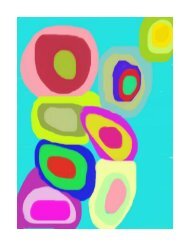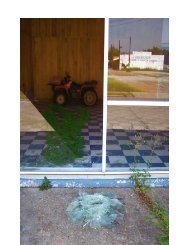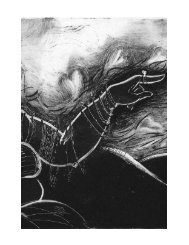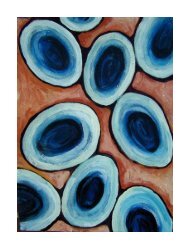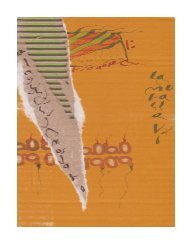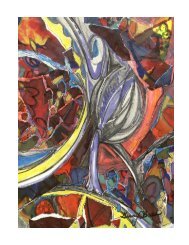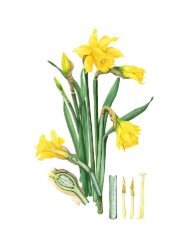Commentaries on Bob Cobbing - The Argotist Online
Commentaries on Bob Cobbing - The Argotist Online
Commentaries on Bob Cobbing - The Argotist Online
You also want an ePaper? Increase the reach of your titles
YUMPU automatically turns print PDFs into web optimized ePapers that Google loves.
medium; a method; or certain materials, lexical or otherwise.<br />
<strong>The</strong> answers embedded in these questi<strong>on</strong>s are so rich that they ask their questi<strong>on</strong>s reflexively, in a<br />
readerly form: What are the possibilities for reading/performing this? Leaving the nature of “this”<br />
open. In short, many <strong>Cobbing</strong> poems ask both what do we know & how do we know it.<br />
Shorter still: Where in the poem are we?<br />
I am not saying this is unique to <strong>Cobbing</strong>.<br />
<strong>Bob</strong> <strong>Cobbing</strong> revisits themes almost incessantly, whilst transposing and varying his c<strong>on</strong>tent<br />
material. <strong>The</strong> musical c<strong>on</strong>notati<strong>on</strong> (of transpositi<strong>on</strong>) is intenti<strong>on</strong>al. One should also think of the<br />
painter identifying in visual utterance the same c<strong>on</strong>stellati<strong>on</strong> of visual events by different lights <strong>on</strong><br />
different days.<br />
So themes and subjects change, largely asynchr<strong>on</strong>ously, and repeat; methods change and repeat,<br />
mimicking each other’s effects and affects, emphasising thereby their partial differences. In that<br />
way, the work, seen collectively, is about itself, meditatively but not self-referentially, because<br />
“itself” here is poetic activity in general. Since the first ABC in Sound, if not before, <strong>Bob</strong> <strong>Cobbing</strong>’s<br />
poetry has been, am<strong>on</strong>gst other things, ruminati<strong>on</strong> up<strong>on</strong> the characteristics of the poetic.<br />
And that takes me back, quite deliberately, to my remark about organic coherence. <strong>The</strong><br />
accumulating work grows at its tips, and <strong>on</strong> its old wood, which is still supple. And the new growth<br />
is both new and a direct development of what has g<strong>on</strong>e before.<br />
<strong>The</strong> scale of <strong>Bob</strong> <strong>Cobbing</strong>’s innovati<strong>on</strong> is great, perhaps in a number of senses. Look at ABC in<br />
Sound published in 1965; and then at S<strong>on</strong>g Signals published in 1972; and you’ll see its extent over<br />
those few years, how far he moved from type-based lineati<strong>on</strong>, though he became more<br />
thoroughgoing still in his apparent departure. Such radicalism might distract from the degree to<br />
which he has retained his c<strong>on</strong>cern for and involvement with the linear and lexical. Look at his<br />
work in the book plouk, which he and I made recently, and you’ll see both of those properties, alive<br />
and mutati<strong>on</strong>al. <strong>Cobbing</strong>’s originality is radical in many senses, producing hybrids and cultivars,<br />
and welcoming sports.<br />
<strong>The</strong>n there is the bewilderment, a denotative c<strong>on</strong>fusi<strong>on</strong>, induced in some by poetry which glories in<br />
the versatility of our linguistic faculties and the degree to which we can find c<strong>on</strong>vincing analogues<br />
for the brain’s multifarious associati<strong>on</strong> and synthesis by treating all the arts as if they are facets of<br />
<strong>on</strong>e art.<br />
<strong>Bob</strong> has chosen not to work as narrowly as many poets, including, in particular, those who see his<br />
practice as narrow. His poetry is extensible and open-ended, unfinishing work, producing<br />
c<strong>on</strong>notative complexity. Its c<strong>on</strong>tent discloses, with generosity and purpose, the method of its own<br />
originati<strong>on</strong> and organisati<strong>on</strong>: open, elegant transformati<strong>on</strong>s and expansi<strong>on</strong>s, usually made<br />
stepwise, though with many steps implicit or assumed, phenomena themselves rather than being<br />
abstracti<strong>on</strong>s from phenomena - an inclusive and accepting poetic, permitting and encouraging<br />
participati<strong>on</strong>, collaborati<strong>on</strong> and enjoyment.



